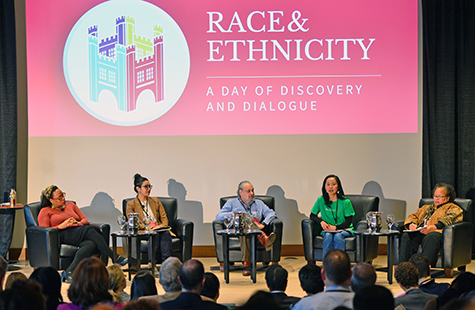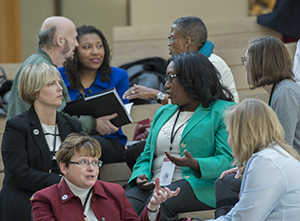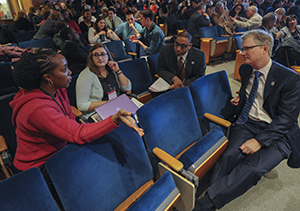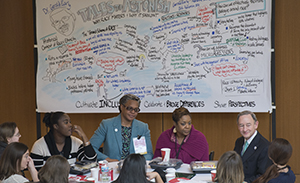
The discovery was an important first step; the dialogue continues.
That’s the takeaway more than 600 participants from within the Washington University in St. Louis community — and many more online — heard in a unique, university-wide forum called “Race & Ethnicity: A Day of Discovery and Dialogue” that took place Feb. 5 and 6.
The event was a series of panel conversations and open forums led by Washington University scholars, students and thought leaders that explored the tough issues of inclusivity brought to light nationwide in the days following the Aug. 9 death of Ferguson, Mo., teenager Michael Brown.

The event was opened by Chancellor Mark S. Wrighton, who stressed the conference’s goal of growth as individuals and as a university.
“This is as an important step toward becoming a more engaged, welcoming and inclusive community,” Wrighton said. “Not a punctuation mark. Not an end. Rather, a necessary beginning if we truly are to ‘do better and be better.’ ”
The structure of the conference, which took place on the Eric P. Newman Education Center on the Medical Campus Feb. 5 and in Emerson Auditorium and Frick Forum in Knight Hall on the Danforth Campus Feb. 6, was to create an experience that allowed anyone from the university community to participate in a comfortable manner, from watching a live feed from the Internet to participating via social media to small-group discussions as part of each session.
In addition, schools and units within the university community tapped 216 faculty, staff and students to serve as delegates. The delegates helped frame the conversation during the conference and now play an important role in identifying and moving forward potential action steps the university can take.
Many ideas were exchanged and tough conversations occurred throughout the sessions. The close of the conference, which ended with a performance of the annual Black Anthology, was by no means the end of the discussion.

“I was really impressed with how engaged hundreds of us were in talking to each other and learning from each other,” said Provost Holden Thorp. “The future of this university community depends on open minds and listening hearts. Our focus now is on maintaining momentum and sustaining the dialogue.”
The website voices.wustl.edu captured the event in real time, via a live feed and also through an aggregate social media page that curated Twitter and Instagram posts as they were occurring. Each session featured small-group discussions, and audience members were given free reign to ask panelists questions.
Visual artist and educator Maketa Wilborn captured the tone and flavor of each session in a vision board as each one unfolded, and a group of students from the Sam Fox School of Design & Visual Arts covered the entire event in drawings and photographs, creating unforgettable images of the conference.

“Easily one of my greatest privileges and honors at WashU,” tweeted delegate Leona Chen, a freshman in business administration at Olin Business School. Chen said later the conference was much more substantive than she thought it would be.
“The issues aren’t just black and white,” she said. “It’s very important to address Latino and Asian-American voices as well, and, while some of the speakers touched on those issues, we need to do more of that on our campus. We have such different experiences as minorities.
“I’m looking forward to taking what I learned back to Dean (Mahendra) Gupta and Olin.”
“The event was powerful and compelling,” said Kim Rokyta, financial analyst in Treasury Services, who also served as a delegate. “Many things said there have been on my mind since the event and I am sure will remain with me. The conference was an important first step.”
Rokyta, Chen and their fellow delegates, which included faculty, staff and students, are now tasked with bringing the message back to the offices, departments and classrooms to share what they learned. The delegates will reconvene Friday, Feb. 27, to talk about their experiences post-conference and continue brainstorming ways to keep the dialogue going on campus.
Other next steps include a complete wrapup of the conference on voices.wustl.edu by the end of the week, including video of all presentations, sessions and Q&As as well as the day captured in photos and video.
“We heard a lot of stories,” Rokyta said. “And about using your own stories as a great way to bring a message to other people. That resonated with me — to personalize it. That’s the approach I am taking to my department.”